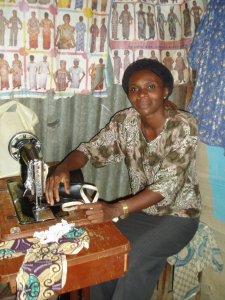Hmm, In Nigeria We Would've...

One of the interesting things about being back in the US for a month and a half has been how often we compare life here to what it was like for us in Nigeria, or how we think Nigerians would've reacted to certain situations. One of the first examples of this was the day after we left Nigeria. We spent a few days in Amsterdam with my brother and the first thing that was obvious (besides how cold it was - 60's F) was how much water was everywhere. The Netherlands is right on the ocean, and it rained while we were there. It's a country where canals criss cross the landscape resulting in beautifully green pastures for cows and sheep. Now irrigation wasn't so odd, but seeing fountains there strictly for the beauty of watching water cascade in arches from the mouths of strange creatures sculpted from bronze certainly was. It struck us that in Nigeria it would've seemed wasteful and extravagant, especially in the dry part of the year we experienced in March and April. In the Netherlands, it was a nice display for people to watch in the park.
Barbara has now been through the first week and a half of her residency program here in Portland, and the first week was largely orientation. I should probably let her tell this story, but I'm not sure when she'll have time (she came home after a 16 hour workday on Sunday :( ). During orientation, she and her fellow new interns were given a briefing on how to use a rather expensive mask when dealing with patients who have tuberculosis, which is transmitted via the air. She turned to another intern who did a medical rotation in west Africa and asked, "Did you ever wear anything for tuberculosis in Africa?" No, was the immediate response. The person instructing them in the use of the mask said that in the past 20 or so years, he's only had to use it about 5 times. In Nigeria, there was no counting how many patients you would come across with tuberculosis in a single day, and Barbara never wore a mask. She'd wash up after every patient, and the kids with it would often sneeze on her, but thank God she didn't catch it. It struck me that the real difference here isn't that you're particularly likely to catch it (if you were, Barbara would have it by now), but rather that because it's so uncommon here, if you were to pass it on to another patient you'd be in for a world of trouble. It wasn't economical, and certainly not practical to wear a mask for every patient in Nigeria that had the disease. The American Lung Association puts TB at about 5.1 cases per 100,000 Americans. However, around the world, there's a new infection every second, according to the World Health Organization.
There's countless other times that we think about how our life here is different from life in Nigeria. Traditional Nigerian clothing seems much more practical than western wear. In the US, we shop all sorts of different stores until we find something that we like the fabric, style, and fit of. Traditional Nigerian clothes were tailored after the fabric was chosen to a style that you discussed with the tailor (the photo is of the tailor that made Barbara's two Nigerian outfits). How much easier is that! I've also discovered that even though I didn't spend a whole lot of time in cars in Nigeria, the freedom of expression used with the car horn has translated somewhat into my bones. I honk at other cars a lot more freely here, and Barb laughs at me everytime.
I think one of the questions that arises is really what we learn from comparing the two cultures, and that's pretty hard to say. It's not something I feel like I'll have figured out in a month and a half, or even probably a year and a half. It's going to take a long time. I will say that some of the comparisons really have informed me about how people are different in different cultures. We value different things and we react to the same events differently. I don't think I'd have as much insight into that if had spent less time in Nigeria, and I also think I'd understand to a much greater extent if I'd spent more time there. Some of the comparisons are merely, ok, we're different and that's ok. Others are more along the lines of, hmm, we really seem to have things backward here, or hmm, they've missed the boat on that over there. Both places could use change, and both places could learn from each other. One question that has plagued me is whether or not the good things from both are compatible in the same society, and for many of them, I just don't know.

